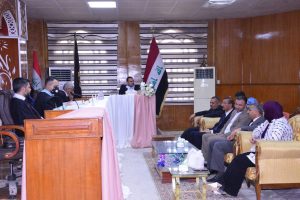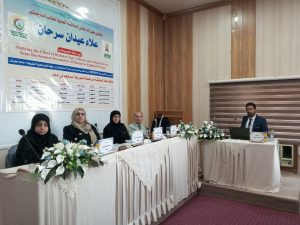The Faculty of Education for Human Sciences at the University of Kerbala has discussed an M.A. thesis entitled “The Aesthetics of Narrative Construction in Hamid Al-Aqabi’s Novels”. It has been discussed in the Department of Arabic Language and submitted by the student (Asmaa Muhammad Kazim)
The thesis aims at revealing Al-Aqabi’s attempt to experiment with new methods in writing his novels, and this is what the researcher endeavored to follow along throughout the research so as to identify these methods and show their aesthetics. It has shed light on Al-Aqabi’s works, rather than other writers is his attempt to write a novel with the characteristics of the poem in terms of building and employing sentences, and this is helped by his poetic talent, which inspired a large part of it on his novels, as well as other reasons related to the neglect of critics and researchers for his efforts in the field of the novel and poetry together.
The chapters of the thesis are divided into sections. In the first chapter, the researcher’s effort is showing the aesthetics of character and event building only for the relationship that binds them together. It is impossible to present an event without the presence of personalities, and the aesthetic cannot be achieved in the characters only without the presence of the work that it does, or an event it is incumbent upon to present.
The second chapter focuses on the effect that the exile has had on the hearts of the people whose bitterness has swept, and how he employed it punitive in a way that gives its aesthetic texts.
The third chapter discusses the aspects that Al-Aqabi found useful in investing, and using them to be in harmony with the themes of his novels, his autobiography which he has employed in his novels.
His novels have discussed social issues that had been embittered by many generations of members of the Iraqi society, both inside and outside Iraq, so he deals with them aiming at knowing the reasons for their outbreak and searching for appropriate solutions in order to reduce its aggravation or recurrence in the coming years.
Al-Aqabi writes his novels from the memory store to document his life and the succession of generations to erase, it is the only way for the individual to achieve himself, and to explore the depths of the past, and this has increased feeling of the value of the past generates a forced dimension from the homeland, so he turns to the past in search of the lost self or proves it in the unknowingness of the future, and its loss means the loss of oneself which involves experiences, experiences and heritage, constitutes the whole of human culture.
The committee consists of the professors whom names are listed below:
Prof. Abdul Amir Mutar Philly – University of Kerbala / Faculty of Education for Human Sciences / Chairman
Assist. Prof. Dr. Iman Abdul Dakheel – University of Babylon / Faculty of Arts / Member
Assist. Prof. Dr. Rafal Hassan Taha – University of Kerbala / Faculty of Education for Human Sciences / Member
Prof. Dr. Khudair Abbas Darwish – University of Kerbala / Faculty of Education for Human Sciences / Member and Supervisor






























































